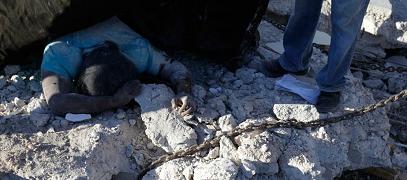Our role in Haiti's plight
Macu Naima
If we are serious about assisting this devastated land we must stop trying to control and exploit it.
Any large city in the world would have suffered extensive damage from an earthquake on the scale of the one that ravaged Haiti's capital city on Tuesday afternoon, but it's no accident that so much of Port-au-Prince now looks like a war zone. Much of the devastation wreaked by this latest and most calamitous disaster to befall Haiti is best understood as another thoroughly manmade outcome of a long and ugly historical sequence.
The country has faced more than its fair share of catastrophes. Hundreds died in Port-au-Prince in an earthquake back in June 1770, and the huge earthquake of 7 May 1842 may have killed 10,000 in the northern city of Cap Haitien alone. Hurricanes batter the island on a regular basis, mostly recently in 2004 and again in 2008; the storms of September 2008 flooded the town of Gonaïves and swept away much of its flimsy infrastructure, killing more than a thousand people and destroying many thousands of homes. The full scale of the destruction resulting from this earthquake may not become clear for several weeks. Even minimal repairs will take years to complete, and the long-term impact is incalculable.




























